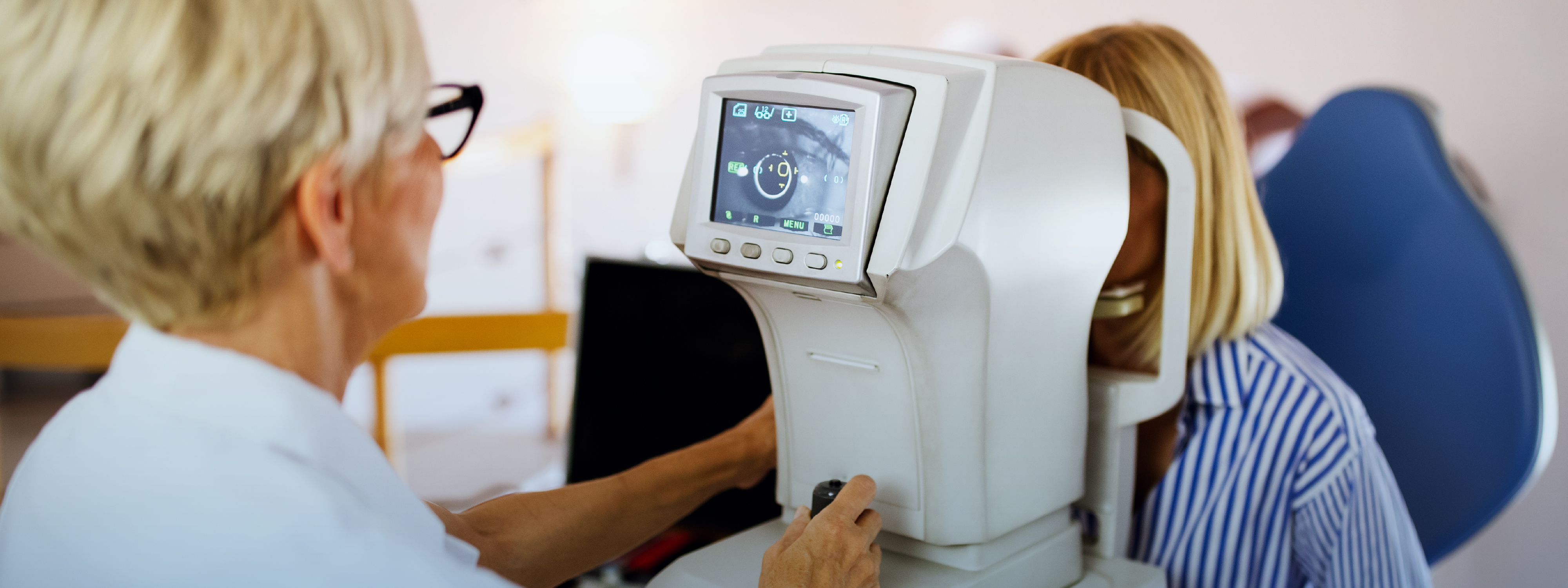 8+ years of exp
8+ years of exp
Languages
English, Marathi and HindiClinics
HealthHub - Al Qusais
HealthHub - Festival City Day Surgery Center and Specialty Clinics
Home › Diabetic Retinopathy

Diabetic retinopathy is an eye condition caused by diabetes, and it’s a leading cause of vision loss among adults. High blood sugar levels can damage the tiny blood vessels in the retina (the light-sensitive layer at the back of the eye). Over time, this damage may lead to blurred vision or even blindness if left untreated. Our clinic offers specialized diabetic retinopathy care in Dubai to help protect and preserve your eyesight. We provide comprehensive diabetes-related eye care in Dubai, emphasizing early detection and advanced treatment to prevent vision complications.
Early stages of diabetic retinopathy often have no noticeable symptoms, which is why regular eye check-ups are vital. Many people with diabetes in the UAE are at risk – studies show that nearly one in five diabetic adults in the region has some form of retinopathy. The good news is that with timely diagnosis and proper care, vision loss can often be prevented. In the following sections, we explain how diabetic retinopathy is diagnosed and treated, and how our expert team in Dubai can help you manage this condition with confidence.
Common corneal and eye surface conditions in adults include dry eye syndrome, corneal infections (keratitis or corneal ulcers often related to contact lens use), keratoconus (a thinning and bulging of the cornea), pterygium (a benign growth on the eye’s conjunctiva that can extend onto the cornea), and allergic eye conditions. Some people may also develop corneal scars or cloudiness from past injuries or genetic conditions. While these conditions vary in severity, our ophthalmology team in Dubai is fully equipped to treat all of them with compassionate, expert care.
Accurate diagnosis is the first step toward protecting your vision. In our Dubai ophthalmology department, experienced ophthalmologists perform thorough eye examinations for patients with diabetes. Key diagnostic methods include:
By using these diagnostic tools, our diabetic retinopathy doctors in Dubai can determine the stage of retinopathy (non-proliferative or proliferative) and whether complications like macular edema are present. Early detection is crucial – diagnosing diabetic retinopathy early means treatment can start promptly to prevent progression.
Our clinic provides a range of diabetic retinopathy treatment in Dubai, tailored to the severity of the condition. Treatment focuses on preventing further damage and preserving vision. After a thorough evaluation, your ophthalmologist will recommend the best approach, which may include medical treatments, laser procedures, or surgery, along with crucial lifestyle modifications.
Key treatments include:
Each patient’s treatment plan is personalized. Often, a combination of therapies yields the best outcome – for example, laser treatment might be combined with anti-VEGF injections for better control of proliferative disease. Throughout the treatment process, our team monitors your progress with follow-up exams and imaging to ensure the retinopathy is responding to therapy.
Why choose HealthHub for expert diabetic eye care in Dubai?
While we offer excellent treatments, preventing diabetic retinopathy or slowing its progression is equally important. There are several steps you can take in your daily life to protect your eyes if you have diabetes:
By taking these preventive steps, patients can often delay or prevent diabetic retinopathy complications. Our team in Dubai will also provide personalized guidance on managing your eye health. We believe that patient education and empowerment are key – when you understand the connection between your diabetes and your eye health, you can make informed decisions and take proactive steps daily to protect your vision.


The most important lifestyle steps are maintaining good control of your diabetes and overall health. This includes keeping your blood sugar levels within target range through diet, medication, and regular exercise. Also, control your blood pressure and cholesterol with diet and medicines if needed. Avoid smoking, as it can further damage blood vessels. Eating a balanced diet (low in refined sugars and saturated fats) and staying physically active will improve your circulation and help protect your eyes. These changes not only slow the progression of diabetic retinopathy but also benefit your general well-being.
Anyone with diabetes (Type 1 or Type 2) is at risk of diabetic retinopathy. The risk increases the longer you have had diabetes, especially if your blood sugar has often been high. Adults who have had diabetes for many years are more likely to show changes in their retinal blood vessels. Other factors can raise the risk or make retinopathy worse – for example, hypertension (high blood pressure), high cholesterol levels, smoking, and pregnancy in diabetic mothers can all contribute. This is why regular eye screenings are recommended for all diabetic patients, even if you feel your vision is fine.
The duration varies based on the severity and type of treatment. Some treatments, like laser photocoagulation, are completed in one session. Others, like anti-VEGF injections, require multiple monthly sessions, followed by periodic follow-ups. Advanced cases needing surgery will also require recovery time and regular check-ups. Diabetic retinopathy management is often long-term, with ongoing eye exams to ensure control. Our doctors will provide a personalized treatment plan.
There isn’t a permanent “cure” for diabetic retinopathy in the way we might cure an infection with antibiotics. However, diabetic retinopathy can be very effectively managed and treated. Early-stage retinopathy can sometimes be reversed or stopped from getting worse with good blood sugar control and treatment. More advanced retinopathy can be treated with injections, laser, or surgery to prevent further vision loss and, in many cases, improve vision. The key is that diabetes is a chronic condition – as long as a person has diabetes, the risk to the eyes remains. This means ongoing vigilance is needed. Think of it like managing diabetes itself: continuous care is required. With regular monitoring and modern treatments, most patients can avoid serious vision loss and maintain good eyesight. Our goal is to control the disease so that it does not control your life.
 8+ years of exp
8+ years of exp
HealthHub - Al Qusais
HealthHub - Festival City Day Surgery Center and Specialty Clinics